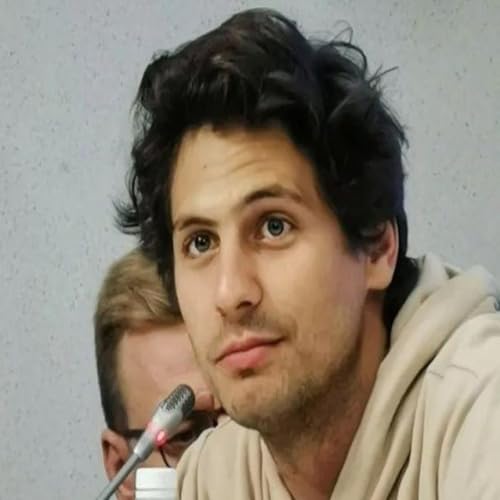3 October 2025
Welcome to the 35th edition of our Russian-language podcast Then & Now with me, Teresa Cherfas
Our guest today is actor and theatre director Alexander Molochnikov.
Alexander Molochnikov (personal archive)In this podcast we are making a break from our usual Russian-language format. This is because our guest has chosen not to speak in his mother tongue. At the age of just 22, he was the youngest director ever to stage a production at the legendary Moscow Arts Theatre. In 2022, aged 29, he had two productions running concurrently on two different stages of the Bolshoi Theatre – one a comic opera, the other a ballet based on Chekhov’s Seagull, for which he won the Golden Mask award. Then on 24th February, 2022, Putin invaded Ukraine…
His latest production, Seagull: True Story – a play that is so meta it has your head spinning – is currently on tour in London from New York. He has described it as his third Seagull, but only the second to fly.
This podcast was recorded on 2 October 2025.
[You can find on the Internet two recent Russian-language interviews Alexander Molochnikov has given to Yury Dud and Mikhail Zygar.]
Questions
- This podcast is about the time before and after the so-called Special Military Operation. What do you remember about the 24th of February 2022?
- You’ve described your current production in London – Seagull: True Story – as your third Seagull, but only the second to fly. What happened to the one that never took off?
- When did you decide you could no longer live in Russia?
- This is the first time we’ve done this podcast for Rights in Russia with a native Russian speaker in English. Is your decision not to speak Russian a political statement?
- What happened to your stage productions that were still in repertoire in Moscow after you left?
- Unlike many of your compatriots in the arts, you had a plan. What was that plan?
- You were a student at Columbia University in New York. What were your impressions of classes there?
- How did these experiences at Columbia inform the rehearsal process for your latest production: “Seagull: True Story”? How did you work with the actors to build the story and write the script?
- In Seagull: True Story, you make the point that the profit margin and commercial viability dictate what gets produced on stage in America and that that is every bit as restrictive on artistic expression as political censorship in Russia. What is your own personal experience of this in New York?
- I completely loved the theatricality of Seagull: True Story – it had an energy and a playfulness, using movement, mime, and props that made it an unmistakably theatrical experience. What is your experience of watching or taking part in theatre productions in the States, or indeed, London since you’re here?
- There’s a fantastic and surreal scene in it, where Putin, bare-chested on a horse appears to Kon, the director, in his dreams. And yet, there’s no Trump anywhere and no overt mention of the parallels between Putin’s Russia and Trump’s America.
- Do you think such parallels can be drawn?
- Kon, your alter-ego, if you like, is desperate to go back to Russia, to visit his mum, to mourn the death of his close friend, who died in a penal colony for speaking out against the war, but he can’t. It’s actually a very moving scene. Do you wish you could go back to Russia for a visit?
- On the one year anniversary of the full-scale invasion of Ukraine by Russia, you posted on social media: “A year ago, at 6:30 a.m., I wrote: “Forgive us.” Today I know you won’t forgive me. I’m 30, I plan to live another 50-70, and I believe I’ll see the day when you will forgive me.” What makes you think that?
- What’s up next for you after Seagull: True Story? Where do you see yourself, professionally, in 10 or 20 years?
 51 分
51 分 1 時間 6 分
1 時間 6 分 44 分
44 分 2025/12/0450 分
2025/12/0450 分 2025/10/3129 分
2025/10/3129 分 2025/10/0634 分
2025/10/0634 分 1,010 時間 45 分
1,010 時間 45 分 46 分
46 分
